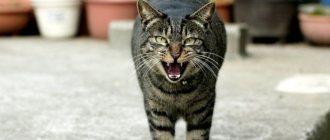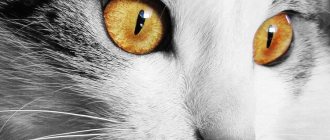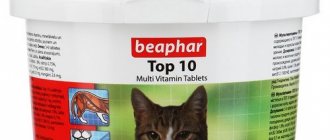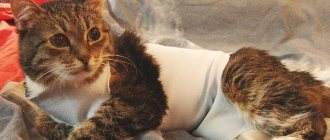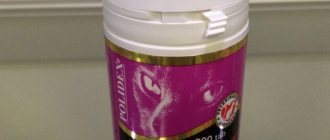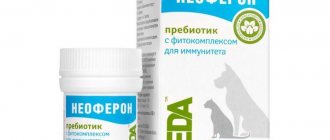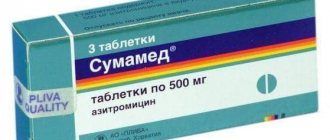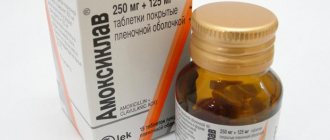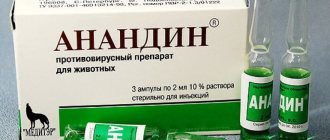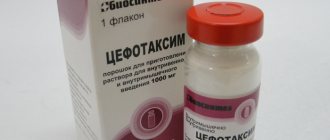What leads to a decrease in immune potential
Despite the fact that cats naturally have strong immunity, under the influence of various unfavorable factors, their protective forces weaken. Cats become vulnerable to viral, bacterial, and fungal attacks.
Causes of immune deterioration:
- lack of vaccinations;
- non-compliance with the vaccination schedule;
- unbalanced diet, cheap feed;
- unfavorable conditions of detention;
- hypovitaminosis;
- early weaning of kittens from cats;
- sudden change in diet;
- chronic, acute pathologies;
- neglect of deworming;
- violation of the rules of care and maintenance;
- pregnancy, lactation;
- infection with internal and external parasites (helminthiasis).
Stress, emotional shock, gross neglect, serious injuries, previous surgical operations, viral-bacterial, fungal infections also lead to weakened immunity in cats.
Deficiency of minerals, amino acids, vitamins against the background of poor nutrition, long-term use of antibacterial agents and other medications have a negative effect.
Cat owners should pay special attention to their pet’s immune system in early spring and autumn-winter.
Five-minute educational program
Almost all the media declare with pathos that “the immune system has not yet been studied.”
This is wrong. Immunology appeared more than 40 years ago, and during this time scientists have made many truly outstanding discoveries. Today we know a lot about immunity, but... With each new discovery, we increasingly want to say: “I know that I don’t know.” In short, there are really a lot of unsolved secrets in this area. Secondly, even many medical and veterinary specialists are somehow sure that the only purpose of immunity is to fight pathogenic microflora that has entered the body in one way or another. Oddly enough, this is not entirely true. Yes, protective systems actually destroy bacteria, viruses and fungi, but another area of their activity is maintaining the constancy of the body’s internal ecosystem. How can this be translated into human language?
https://www.youtube.com/watch?v=ytpolicyandsafety
Let's take cancer for example. A terrible disease that annually claims the lives of many thousands of people (and no one even counts animals). Do you think that the formation of a cancer cell in our body is something out of the ordinary? We will surprise you. In the body of animals and humans, tens of thousands (!) of potentially malignant cells are formed every day (!), but they are killed by the immune system. As you can understand, its significance is unrealistically great.
Why did we need to give these facts out loud? It's simple. Firstly, immunity is an incredibly complex system; research in this area will be enough for more than a dozen years (or even a couple of hundred). Secondly, its meaning is much more important than is commonly thought. What is the conclusion? It's simple. For cats with viral diseases, bacterial or fungal infections, immunomodulatory drugs are prescribed with caution, under the constant supervision of a veterinary specialist.
Remember the consequences of thoughtless interference with the immune system. So, around the 60s, there was a real boom in immunostimulants in the USSR. This is the well-known drug ASD, and aloe extract, and other drugs. These names are still heard by many. But it is still not widely advertised anywhere that in the early and late 80s of the last century, many Moscow pediatricians found out that “reliance” on immunomodulators leads to catastrophic consequences, up to the complete inability of the immune system to resist infectious diseases.
Similar conclusions were drawn in the United States, where the distribution of these drugs occurred at approximately the same time. Since then, doctors have been very wary of immunostimulants. Veterinarians have come to this conclusion only in recent years.
How to understand that a cat has low immunity
If a furry pet's resistance decreases, its immunity weakens, the animal often gets sick. The body is vulnerable to viral and bacterial attacks.
The main manifestations of low immunity in cats:
- poor appetite, sudden weight loss;
- deterioration in wool quality;
- changes in behavior, mood swings;
- drowsiness, apathy, depression;
- discharge from the nose, eyes;
- unstable temperature.
Exercise stress
Active games and any other physical activity have a positive effect on a cat's health. At the same time, hematopoietic processes are activated in the animal’s body, which leads to a renewal of the composition of blood cells that provide immune protection.
Lack of physical activity in cats leads to obesity, sore joints, flabby muscles, and swelling. The cardiovascular and respiratory systems are primarily affected. Always devote time to your pet, play with her, take her for walks, this will have a positive effect on her health.
How to boost your cat's immunity
An effective effective method that activates the launch of specific antibodies to certain types of pathogenic elements is preventive immunization (vaccination/re-vaccination). After vaccination, specific antibodies are formed against certain diseases.
Important! The effectiveness of the vaccine is 1-3 years, so do not forget to systematically revaccinate your pet.
What to do to boost your cat's immunity:
- Make dietary adjustments. Supplement natural ingredients with vitamin and mineral complexes. Feed only with professional quality food.
- Protect your cat from stress and emotional distress.
- Moderate physical activity, activity.
- Comply with sanitary and hygienic standards.
- Promptly treat for ectoparasites, remove worms every 34-60 days.
- Maintain intestinal microflora (enzymes, probiotics).
It is equally important to carry out systematic hygiene procedures and follow the veterinarian’s recommendations during the rehabilitation period after operations and illnesses.
Vitamins for kittens
The body of a growing kitten constantly needs a large number of building elements. Complex vitamins will fully provide the baby with important resources for growth, during the change of teeth, molting, during the transition to natural nutrition after breast milk, and during stress associated with moving to a new place of residence.
global $ads_google; //data-ad-slot=”2475549904″ $ads_google = empty($ads_google) ? false : true; ?> if ($ads_google == false) {?> $ads_google = true; ?> } ?>
Before treating your young cat with vitamins, you need to find out how to give them correctly from a veterinarian:
- Beafar KITTY'S Protein and Junior;
- Doctor ZOO for kittens;
- Hartz Everyday Chewable Vitamins with Taurine;
- Gimpet Babytabs.
The baby is constantly growing and developing, so it is important to maintain a balance of all the necessary elements: vitamin-containing preparations must contain calcium and magnesium, which are often lacking in a young mustache up to a year old.
Should I give vitamins to my kitten?
In the first 2-3 months, the kitten receives all its valuable nutrition from its mother. If she eats high-quality premium food, then veterinarians believe that there is no need for additional beneficial supplements - diligence here will backfire and the babies will develop hypervitaminosis .
Fluffies whose mother did not receive enough vitamins have a hard time: they may begin to lag behind in development, and the lack of important elements will immediately affect their energy and appearance, even of a month-old cat.
At what age can you give vitamins to a kitten?
A weak baby can be given vitamins in the form of drops from the first days of life - strictly on the recommendation of a specialist. For healthy “bundles of happiness,” vitamin complementary foods are introduced starting from the moment of weaning and the transition to a new diet at approximately 1-1.5 months. If at 2 months kittens are fed the milk of a cat that is fed fully, then you can hold off on adding useful supplements.
At 3 months, the baby has already switched to a separate diet and needs supplements according to the dose of the drug, calculated in accordance with the instructions on the package.
For the vision of small kittens, it is important to receive vitamin complexes with taurine. B vitamins are very useful - this is a gift for a kitten's fluffy fur, and B12 is needed for the formation of a stable nervous system.
How to strengthen a cat's immunity
To strengthen, activate, and restore protective forces, immunomodulators (immunocorrectors) are used in veterinary practice. Created on the basis of natural, microbiological, biological, synthetic components.
Immunomodulators for cats:
- Gamavit, Gamavitforte . Vitamin immunostimulating complex preparation with a pronounced antiviral effect. Contains minerals, amino acids. Prescribed for prevention and therapeutic therapy for various pathologies and viral infections. Improves natural resistance, accelerates the recovery period, eliminates the effects of stress and intoxication.
- Aminosol . A veterinary drug that stimulates the immune system based on hydrophilic vitamins, amino acids, liquid salts for cats of different breeds and age groups. Prescribed for stress, loss of appetite, septic conditions, oncology, to restore the body after operations, illnesses, as well as during periods of intensive growth and development.
- Immunophore . Increases resistance to infections, stress, resistance, normalizes immunity.
- Imuno-Vet for cats . The composition of the drug includes extracts of medicinal herbs and plants. Used in cases of weakened immunity, to normalize metabolism, in the treatment of fungal and viral infections, and in the postoperative period. The veterinary drug has an anti-inflammatory and antibacterial effect. It has a beneficial effect on the nervous, respiratory and reproductive systems of the body. Increases resistance to pathogenic agents.
- Vetom 1.1 . A complex drug for the treatment of various diseases, stimulation of defenses. Accelerates growth, normalizes metabolic processes, removes toxins from the body. Used for various immunodeficiency conditions in animals.
- Pharmax . Vitamin and mineral preparation. Improves immunity, increases the body's resistance to infections, accelerates the process of recovery and rehabilitation. Helps cope with stress, normalizes metabolism.
- Roncoleukin . Prescribed in the treatment of purulent-inflammatory and oncological diseases. Prescribed to restore immunity.
- Glycopene . Eliminates post-vaccination complications, increases the effectiveness of vaccines, stimulates regeneration, increases cellular immunity, and reduces the risk of developing oncological processes.
- Evinton . Complex veterinary drug for stimulation and enhancement of nonspecific immunity. Prescribed in the treatment of viral diseases of unknown etiology.
Precautions when using vitamin complexes
The main feature that cat owners should understand is that an excess of microelements and vitamins in a cat’s body is undesirable. Therefore, when independently deciding that heart-shaped vitamins for cats or any other supplements advertised by marketers should be introduced into the cat’s diet, the pet owner takes responsibility for the cat’s further well-being.
To avoid mistakes and bitter experiences, it is recommended to entrust the selection of drugs to veterinarians. When prescribing medications, a veterinary medicine specialist will take into account all the features - analyze the pet’s age and lifestyle, pay attention to the cat’s heart and the functioning of other internal organs and body systems.
In addition, the specialist will study the pet’s medical history, conduct a series of laboratory tests and prescribe the exact drug the cat needs. For example, a veterinarian will recommend dental vitamins for cats suffering from dental disease. These could be Beaphar cat vitamins, designed specifically for pets.
At the same time, pets with signs of vitamin deficiency will receive another drug as drug therapy. For example, a veterinarian may prescribe Gimpet cat vitamins or other complexes.

